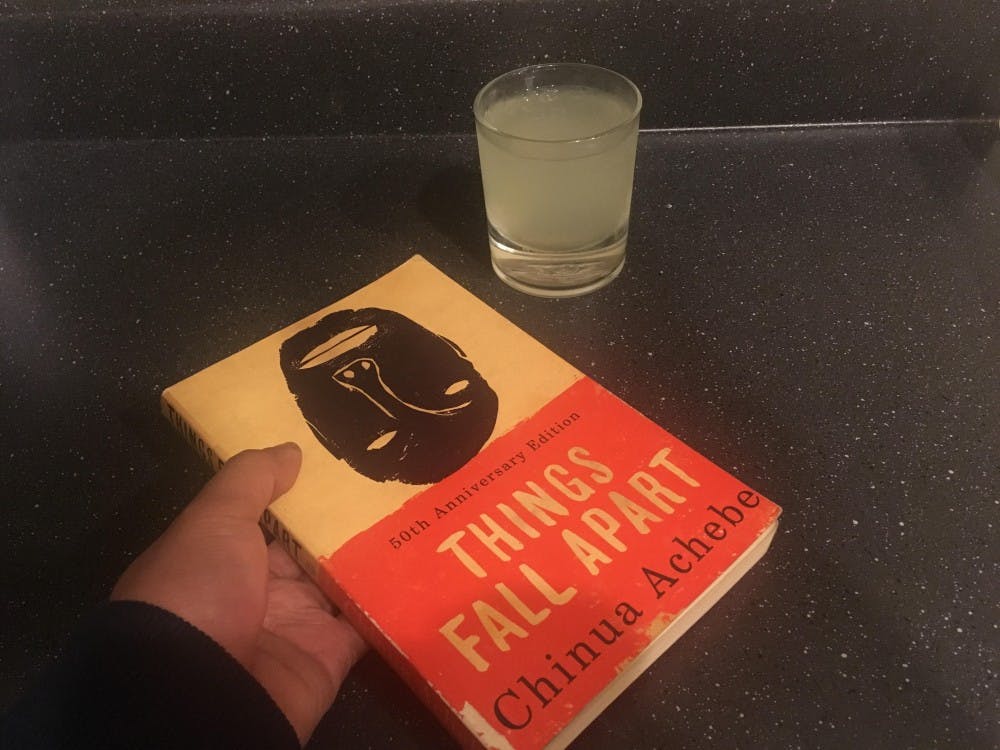Continuing a series started by former reporter and current digital editor Carson Abernethy in 2016, the arts and culture editors will drink their way through great works of literature, reviewing books and the booze that inspired them.
Chinua Achebe’s first novel “Things Fall Apart” is considered one of the greatest works of African literature. The 1958 novel follows Okonkwo, a respected warrior of the Umuofia tribe in what is now present day Nigeria, as he tries to adapt to colonial system as it changes and eventually collapses the world he knew. Achebe is critical of colonialism in his work and toured the U.S. giving lectures at universities with fellow authors to raise awareness of the Nigerian Civil War, a conflict that developed in the post-colonial era. “Things Fall Apart” is a finely crafted allegory about colonialism, its collapse and disruption to the African tribal system.
Recipe:
The characters in “Things Fall Apart” drink palm wine, a traditional alcoholic beverage in the region, in a few scenes. This recipe for a palm wine cocktail comes courtesy of the Houston Chronicle:
2 ounce of Lillet Blanc
6 raspberries
¼ ounce of simple syrup
1 ounce of palm wine
¾ ounce of dark rum
Place Lillet Blanc, raspberries and syrup in a shaker with ice. Shake well and strain into a glass filled with ice. Top with palm wine and rum. Garnish with extra raspberries if desired.
Prose: 5/5
The novel opens with the first stanza of the poem “The Second Coming” by William Butler Yeats, from which the title is taken. Achebe incorporates the poem seamlessly and uses it to foreshadow the tragedies Okonkwo faces as well as the collapse of the social structure he is used to. Achebe’s writing is fluid and his novel shocks and awes as the plot develops.
Characterization: 4/5
Okonkwo is a complex and flawed character making futile attempts to resist change in their world. Even though he makes questionable decisions, Achebe makes his protagonist relatable. The supporting characters aren’t as well developed, but they all have a significant impact on the protagonist and deepen the allegorical aspects of the novel.
Cohesiveness: 5/5
Achebe structures the novel into two arcs, using the first to establish the setting, develop the characters and further foreshadow the events in the second part of the novel. The second arc puts Okonkwo face-to-face with Christian colonizers and is an incredible depiction of a clash of cultures and imperialism. Each story progression functions independently but complements the other well.
Relevance: 5/5
Countries all over the world are still dealing with the aftermath of the colonial system and imperialism is not a thing of the past. Countries like Nigeria are still dealing with tribal and religious violence and instability left over from colonial times. The issues and themes Achebe explores in “Things Fall Apart” are as relevant today as they were when it was published.
Overall: 4.75/5
“Things Fall Apart” is a widely renowned classic that will keep readers engaged, especially those with an interest in history. While the novel might be fiction, it accurately depicts the pains of colonialism and provides insight into the point of view of those being colonized opposed to those colonizing. History, in this case, wasn't written by the victor.
Read More: Books and Booze: ‘To Kill a Mockingbird’ by Harper Lee
Read More: Books and Booze: 'Brave New World' by Aldous Huxley
Reach the reporter at jicazare@asu.edu or follow @sonic_429 on Twitter.
Like State Press on Facebook and follow @statepress on Twitter.




